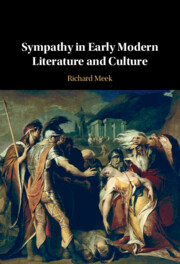
- Cited by 3
-
Cited byCrossref Citations
This Book has been cited by the following publications. This list is generated based on data provided by Crossref.
Ross, Sarah C. E. 2024. Shakespeare Survey 77. p. 180.
Huth, Kimberly 2024. “This Forcèd League”: The Compassionate Body in The Rape of Lucrece. Renaissance and Reformation, Vol. 47, Issue. 1, p. 137.
Shahidul Islam, Mohammad 2025. Striking a paradoxical balance: Shakespearean insights for hospitality management. Tourism and Hospitality Research, Vol. 25, Issue. 1, p. 147.
- Publisher:
- Cambridge University Press
- Online publication date:
- April 2023
- Print publication year:
- 2023
- Online ISBN:
- 9781009280259


